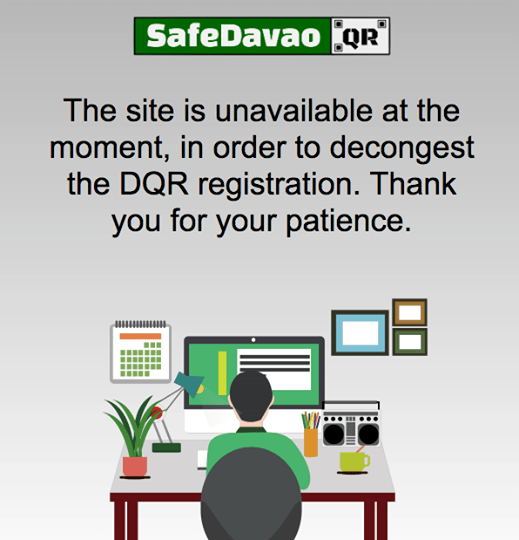
The city government of Davao temporarily shut down the QR registration portal due to traffic congestion (image from SafeDavao QR Facebook Page)
Davao City Mayor and presidential daughter Sara Duterte-Carpio moved the enforcement date of the SafeDavao QR (DQR) code from November 7 to November 23 as glitches forced the registration portal forced the website to be temporarily shut down.
Duterte-Carpio said the website experienced a surge of visitors after she announced on Tuesday, November 3, the use of the DQR for the city. She added that the portal had 10,000 registrants in a single day.
“They (developers) sought [our] permission to take it down to stop thousands of people from accessing it. It will be restored once the people calm down since they seemed to be competing in accessing the site,” she said over her Davao City Disaster Radio program on Thursday, November 5.
She added that the postponement of the enforcement of the mandatory DQR will give establishments enough time to prepare their scanning equipment.
Before Duterte-Carpio announced the postponement, the City Government announced on Wednesday evening, November 4, via the SafeDavao QR Facebook page that the registration website was temporarily unavailable.
“The site is unavailable at the moment in order to decongest the DQR registration. Thank you for your patience,” the City Government posted on the SafeDavao QR Facebook page.
The mayor said the city government “will extend the time for registration before the mandatory DQR gets enforced.”
“Anyway, establishments are still preparing their hardware. This way, people will not access the site all at the same time,” she added.
However, Duterte-Carpio cannot provide a date when the website will go live again as this will all depend upon the advice of the website developers.
The mayor issued Executive Order (EO) 60 on Tuesday, November 3, mandating the use of the DQR starting November 7 for all residents and non-residents of Davao City for its coronavirus disease 2019 (Covid-19) contact tracing efforts.
Under the EO, those who fail to present their DQR while in public will be apprehended.
In EO 60, no penalties were indicated for those who will be apprehended without a QR code.
Since the enabling ordinance for the DQR has yet to be approved upon by the City Council, violators, in the meantime, will be “held for an interview”.
But once the ordinance has been passed, Duterte-Carpio said penalties for the violators can range from a fine to community service.
Canceled or falsified information used in securing the DQR can land a person in jail as this constitutes falsification of public documents.
Davao City has recently seen an upsurge in local transmission cases of Covid-19.
The city government, in a statement, said the DQR is not exclusive to Davao City residents. Non-residents who do business here or have essential travel purposes in the city are also required to get a DQR.
Duterte-Carpio reiterated that that the city did not set any deadline for the DQR registration but the implementation of the mandatory DQR will take effect on November 23 “until further notice.”
Social media was recently flooded with posts from disgruntled Davao City residents who had a hard time registering on the site. Rommel F. Lopez